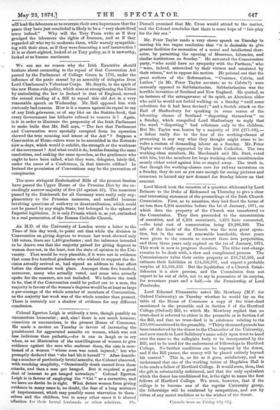Mr. Peter Taylor made a very clever speech on Tuesday
in moving his too vague resolution that "it is desirable to give greater facilities for recreation of a moral and intellectual char- acter, by permitting the opening -of Museums, Libraries, and similar institutions on Sunday." He entreated the Conservative party, "who could have no sympathy with the Puritans," who "were, indeed, untouched by their virtues and untainted by their crimes," not to oppose his motion. He pointed out that the great authors of the Reformation, " Cranmer, Calvin, and Luther," (is Mr. Peter Taylor accurate as to Calvin?) were earnestly opposed to Sabbatarianism. Sabbatarianism was -the horrible invention of Scotland and New England. He quoted, as an instance of the extragavance of its spirit, an Aberdeen elder who said he would not forbid walking on a Sunday "until some substitute for it had been devised ;" and a Scotch attack on the Earl of Shaftesbury for speaking in some verses of the labouring classes of Scotland "disporting themselves" on a Sunday, which compelled Lord Shaftesbury to reply that the word "disporting" had reference only to the children. But Mr. Taylor was beaten by a majority of 203 (271-68),- a defeat really due to the fear of the working-classes of promoting in any way what they thought might come to in- volve a custom of demanding labour on a Sunday. Mr. Peter Taylor was chiefly supported by the Irish Catholics. The two working-class members, Mr. Macdonald and Mr. Burt, voted with him, but the members for large working-class constituencies mostly either voted against him or stayed away. The truth is, that though the working-classes care for railway excursions on a Sunday, they do not as yet care enough for seeing pictures and museums to hazard any new demand for Sunday labour on that account.


































 Previous page
Previous page